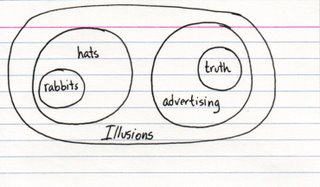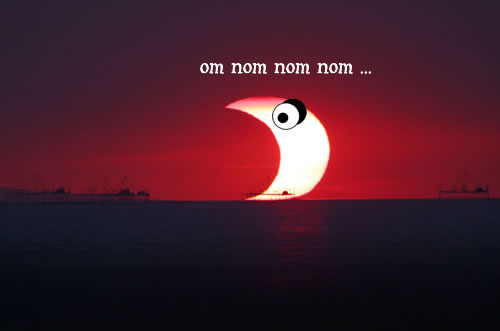 A few weeks ago, Gordon Campbell wrote an excellent fisk of the Media Biz 09 conference advertising bumpf. This morning on Mediawatch (from 06:30) Colin Peacock covered the issue in characteristic depth, interviewing the conference organiser and two of its luminary speakers, the ones who would “share the secrets of getting your message across positively”, help delegates “get inside the minds of the men whose leadership shapes what the viewing audiences see” and enable them to “get your story to the top of the pile”. Three wise and grizzled industry heads, when questioned by Peacock, emphasised two things; first, that the marketing material was breathless over-hyped bullshit, and second, there were in fact no secrets to impart:
A few weeks ago, Gordon Campbell wrote an excellent fisk of the Media Biz 09 conference advertising bumpf. This morning on Mediawatch (from 06:30) Colin Peacock covered the issue in characteristic depth, interviewing the conference organiser and two of its luminary speakers, the ones who would “share the secrets of getting your message across positively”, help delegates “get inside the minds of the men whose leadership shapes what the viewing audiences see” and enable them to “get your story to the top of the pile”. Three wise and grizzled industry heads, when questioned by Peacock, emphasised two things; first, that the marketing material was breathless over-hyped bullshit, and second, there were in fact no secrets to impart:
Mark Jennings, TV3 Head of News and Current Affairs:
“I think the marketing for this event has been over-egged […] I can tell you right now that if anybody coming to this conference thinks they’re going to learn any super-secrets on how to handle the media, they’re mistaken. There aren’t any great big secrets, and if there was, we wouldn’t be divulging them.”
Mark Sainsbury, TV One Close Up Host:
“I paid no attention to the marketing of this thing. I had quite a simple inquiry from Rob Harley saying they were doing this conference, that it was mainly for voluntary groups, community organisations in terms of how to understand the media […] This is the conference as it was sold to me, and the marketing, of course, as you well know, is something totally different. You don’t go along to, almost a semi-public conference, and people are somehow going to be handing over the secrets. […] I mean, there is no great sort of secret to hide or anything to impart.”
Rob Harley, Media Biz 09 Organiser:
“I’m wondering what they [journalists not involved in the conference who have expressed concerns] think those secrets are. […] we could argue the toss all morning about how we worded the brochure, or whether if we’d spent a bit more time workshopping it we could have got it right, fair point.”
I have a few questions in response to this rather remarkable set of statements.
1. Given that there are in fact no great secrets, why would anyone attend such a conference, at a cost of $2k per delegate?
2. If the conference is in fact pitched at the voluntary sector, community groups, educators and the like, variations of which were affirmed by all three speakers including Harley, why is it billed as “the ultimate conference for business people seeking more effective use of the media”, and why does it cost $2k per delegate (a cost far beyond the budgets of most such groups)? Come on, the word `biz’ is even in the conference title!
3. Why would anyone take communications advice from a bunch of people who have so abjectly failed to: a. communicate the purpose of their conference; b. correctly identify its target audience; c. market their conference material in such a way that it actually has some relationship with reality; d. avoid negative publicity for all of the above; and e. make any sort of justification to combat negative publicity stemming from the above failures, other than `well, yeah, the marketing is bollocks and there are no secrets anyhow’?
It’s possible to view this either as sinister or incompetent: either the conference organisers and the news agencies involved are just utterly incompetent and are now making excuses, or there is a co-ordinated post-hoc damage control programme underway, as those same people try to spin the story away from Gordon Campbell’s argument that this was a sinister meeting of the news and PR industries and an assault on media independence.
According to all three interviewees, the real purpose of the conference was to allow news professionals to try to help people understand how the media works at an operational level so as to help them make it easy for the media to run their story: essentially, promoting media literacy among sectors who are traditionally not media literate. This ostensibly to combat cases like the example Rob Harley gave, where “everybody lost because the requisite information was not included in the news, stuff that had been said overseas which really needed to be commented on in New Zealand went begging for an explanation.” He’s absolutely right – there is a strong public good in having all sectors of the community meet a minimal standard of communications expertise. This sort of training can be a hugely important service, imparting skills (not `great secrets’) which are already widely exercised in business circles to groups without the capacity to employ trained comms staff or PR firms.
So, in my view, Rob Harley and the others involved in Media Biz 09 have a great opportunity to match their actions to their fine words about media literacy and the community and voluntary sector, by inviting a few delegates from key community or voluntary organisations to attend on a pro-bono or subsidised-fee basis. The conference is (presumably) too close to deadline to cancel, according to Harley it probably won’t break even anyhow, and I can’t see this epic PR fail helping to lift enrolment among the monied businessfolks at whom it’s targeted. But there’s no doubting the credentials of the speakers, and it’ll probably be a cracking two days. An opportunity for those involved to do some good, restore a bit of goodwill in the media, and wipe some egg off their well-known faces.
Edit: Gordon has emailed me to point out the seemingly-obvious, that they’re not so much knaves or fools, but apparently knaves then fools.
Edit, 20090217: Event director Richard Nauck told bFM’s Jose Barbosa a few interesting facts. First, he says half the registrations are non-profit organisations, while most of the remainder are small-business and schools; second, all the non-profits got in for half-price, and only about 20% of attendees have paid full-price; third, he “truly regrets” the use of the word `secrets’ in the advertising bumpf. In the same session, Jose also interviewed Brian Edwards, who does this sort of thing himself, but retains grave concerns about the conflicts of interest for the media people involved.
L

